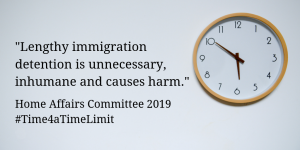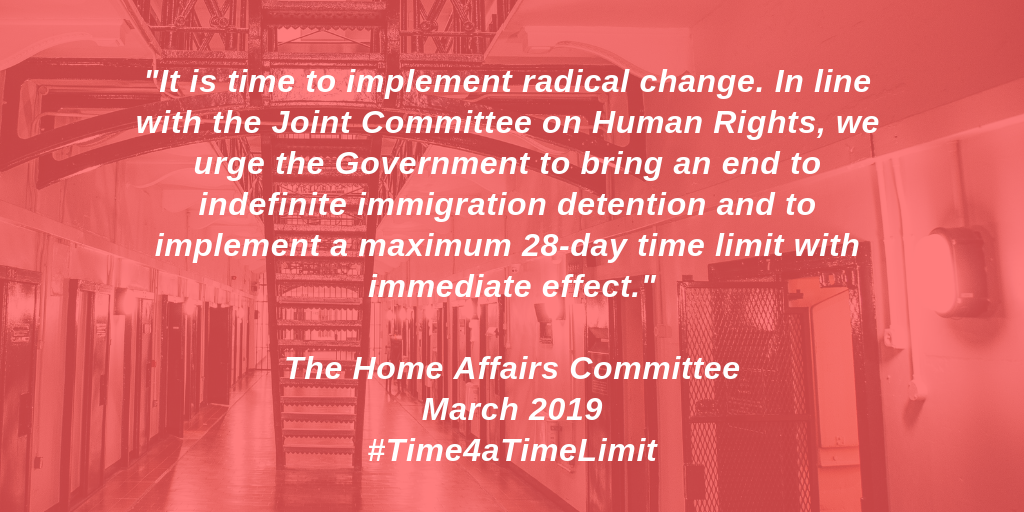Today, the Home Affairs Committee has published its long-anticipated report on immigration detention. The Committee strongly rebukes the Home Office for its ‘shockingly cavalier attitude to the deprivation of human liberty and the protection of people’s basic rights’.
Over the course of our inquiry, we have found serious problems with almost every element of the immigration detention system. People are being wrongfully detained, held in immigration detention when they are vulnerable and detained for too long … [The Home Office] needs to be more transparent in collating information about the number of people who are wrongfully detained, it must give evidenced explanations as to why decisions to detain have been made and it needs to admit where things have gone wrong, apologise, and seek to learn lessons. Above all, it must do much more to ensure that all reasonable alternatives to detention have been considered before detention is authorised.
Home Affairs Committee
The report marks the culmination of a year-long inquiry, initially prompted by revelations of systemic neglect and abuse in Brook House Immigration Removal Centre. It follows hot on the heels of a report published by Joint Committee on Human Rights just last month.
Both the Home Affairs Committee and Joint Committee on Human Rights have called on the government to implement a 28 day time limit on immigration detention ‘with immediate effect’.
While the indefinite nature of detention traumatises those who are being held, it also means that there is no pressure on the Home Office and on the immigration system to make swift decisions on individuals’ cases. There is a rapidly growing consensus amongst medical professionals, independent inspectorate bodies, people with lived experience and other key stakeholders on the urgent need for a maximum time limit. Lengthy immigration detention is unnecessary, inhumane and causes harm.
Home Affairs Committee
Amendments tabled to the Immigration and Social Security Coordination Bill making its way through parliament indicate cross-party support for this change.
A damning indictment of immigration detention from @CommonsHomeAffs Theres x-party support for Labour’s 28-day amendment to the immigration bill. It’s #Time4aTimeLimit #EndIndefiniteDetention https://t.co/e7qjViwoRK
— Afzal Khan MP (@Afzal4Gorton) March 21, 2019
Both Committees have also called for an end to the detention of vulnerable people, automatic judicial oversight of decisions to detain, and a focus on alternatives to detention as the first choice, rather than an after-thought.
Detention Forum Project Director Eiri Ohtani said:
We are pleased to learn that the Home Affairs Committee has reached the conclusion that there should be a time limit on immigration detention; automatic judicial oversight should take place after 72 hours of detention; vulnerable people should not be detained; and more community-based alternatives should be developed to reduce detention – all the changes we at the Detention Forum believe are crucial steps in overhauling the UK’s mass, routine, indefinite immigration detention.
We particularly welcome the fact that the Committee decided to widen the inquiry’s initial scope from Brook House IRC (which was the subject of a BBC Panorama documentary) to include all aspects of the UK’s immigration detention system. This change of direction was crucial.
People with first hand experience of detention played a key role in drawing the Committee’s attention to the need to examine immigration detention in its entirety – and we commend their work.
Freed Voices cautioned that the exclusive focus on the Brook House missed the point when what was needed was a fundamental to the change to the whole system.
Of course, the Home Office will blame G4S; G4S will blame its staff. But it’s not time for finger-pointing – it’s time for a time limit.
Freed Voices, writing in The Guardian
And the voices coming from the Hunger for Freedom strike by women in Yarl’s Wood IRC ensured that Committee members heard directly from people locked up in detention centres.
The seven women and one man were clear from the outset that uncertainty over how long they would be held “is a killer”. One person said that prison is better because you know how long you will be there. They also described the trauma of detention. “We can’t go anywhere, do anything, we are constantly watched, we can’t access papers we need.”
Stuart McDonald MP, writing for Open Democracy
There is no doubt that these calls from people with direct experience of detention and their direct input into the inquiry made the Committee’s findings robust and meaningful. Any future detention policy making process by the government must involve experts-by-experience at every stage.
The Committee’s demand that the Government produces a comprehensive action plan for its work on alternatives to detention, its success indicators, and an update in response to this report is a timely and necessary one. While we welcome the Home Secretary’s announcement in July 2018 about an alternatives to detention pilot, we are disappointed not to receive any updates. Migrants themselves and a range of civil society organisations must be part of the development of and discussion about alternatives to detention.
Now, the Committee has joined an ever-growing list of parliamentary groups, institutions, organisations and people with lived experience of detention calling for a 28 day time limit on immigration detention. The ball is clearly in the Home Secretary’s court. We believe that the most decent thing for the Home Secretary could do is to take this opportunity and end indefinite detention once and for all – that’s what a true leader would do.






